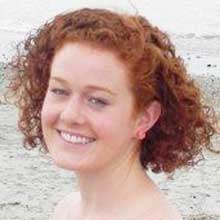- Hometown: Cromwell, Connecticut
- Major: B.S.P.S.
- Graduation Year: 2015
Why did you choose URI?
I was a prospective student-athlete looking for a program invested in both the development of my career after graduation and my athletic goals during college. When I was deciding to commit to URI I was convinced that this program was one that would support my goals in my sport and in the classroom. The flexibility of the BSPS program allowed me to complete the program within four years, and take advantage of hands-on experiences that will accelerate my career after college.
Why did you choose the BSPS program?
I was a marine biology major for two years, but decided I wanted to study infectious diseases and drug development. The faculty in both the marine biology program and BSPS program made this transition simple. I started the program only a year ago but the faculty in the BSPS program helped make it possible for me to graduate on time, and take advantage of internships. I am glad I made this transition. The program is challenging but I love learning about drug metabolism, developing treatments for diseases, and being a part of research within the college.
What has been the best part of your studies in the College of Pharmacy?
The hands-on work the program engages their students in. We are doing real research instead of routine labs to practice lab skills. For an undergraduate, this type of learning experience is massive in becoming competitive for graduate school and job applications. The College of Pharmacy and the Honors Program also work together to expand this kind of learning experience. In an Honors class I took, I worked with other pharmacy students and professors to develop a policy proposal for alternative PTSD therapy for returning veterans, and with the help of the Honors Program and the College of Pharmacy we went to present our paper at a conference in Baltimore. The work we do as students is for much more than just a grade. The work students do in collaboration with professors develops competitive young professionals.
What has been the best part of your entire URI experience?
Being a student-athlete. I love my teammates and my coaches, and I feel pride competing for the URI swim team. There is no other team I would want to compete for. The program brought my athletic skills to a level I did not think I could reach. By my junior year I was competing with pro-athletes and Olympians, and made NCAA division I cuts. We have a very close-knit team as we go through the challenges of school and athletics together.
What do you consider the biggest strengths of your major or program?
As a BSPS student preparing to graduate I am prepared for a career after college. In this program I have had the opportunity to work on new research, participate in research outside my field of study, and become involved in international conflict relief work. All of these opportunities have been the result of the work by the faculty of this program. The professors and advisors are responsible for developing competitive graduates. The biggest strength of this program is the faculty and all they do to help students take advantage of opportunities to think big for global change.
What kind of internships, experiential learning opportunities, or real-life experiences have you had?
The internship that had the most impact was when I worked in northern Uganda for the NGO, ChildVoice International. I was conducting a research project looking at the cultural norms that relate to sexual and gender-based violence in post-conflict areas. I conducted many interviews and participated in local government meetings on this subject, trying to learn why this violence happens. While I was there I also worked in the refugee camp for the South Sudanese in Adjumani, Uganda, interviewing young mothers about their experience in war and in the camp. It was an amazing experience that was well beyond anything I could learn in a classroom or laboratory.
What has surprised you most about URI?
The investment URI puts into the academic development of athletes. Most coaches at the college level require athletic training and competition to come before school. This is not the culture of URI athletics. My coaches told me, before I started swimming for URI, that I was going to be a student before an athlete. Every year they have lived up to this statement. I was also surprised by the support I received from the Honors program, College of Pharmacy, and the Athletic Department to pursue an internship in northern Uganda. This trip was not a standard internship for pharmaceutical students, yet I received enormous support.

